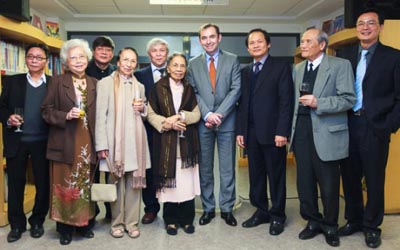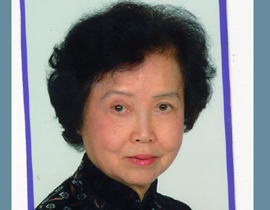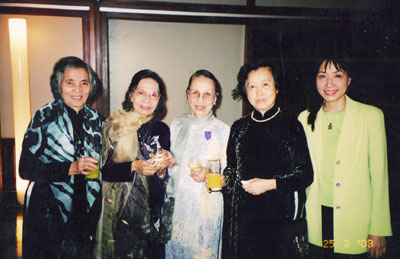
>>Professor, Doctor, and People's Teacher Hoang Thi Chau has passed away.
Hoang Thi Chau was born in 1934 in the suburbs of Hue. She was the youngest daughter of a family of civil servants during the French colonial period. As a child, she attended primary school in Phu Yen. When the Democratic Republic of Vietnam was established in 1945, she moved to Hue with her father and older brother. While continuing her studies there, the resistance war against the French broke out. With the patriotic spirit of youth, she simultaneously attended school and participated in revolutionary activities, fighting in the youth guerrilla unit within the city.
Hoang Thi Chau was the first female professor in Vietnamese linguistics. To this day, she remains one of the oldest professors in this field, a science known for its dryness and difficulty. To achieve this honor, this woman from Hue, once famous as the "beauty queen" of the Faculty of Literature at Hanoi University, had to work persistently under challenging circumstances. Many generations of students and colleagues have always respected her not only because she was a former guerrilla fighter who fought in countless battles, but also because she was a dedicated and passionate scientist who contributed greatly to her field. It can be said that she was an exemplary teacher and mother, a role model for anyone growing up.

The late Professor and People's Teacher Hoang Thi Chau (1934-2020)
Her family was a traditional revolutionary family. Her parents had sheltered revolutionary cadres in their home throughout the war against the Americans. All three sisters had been active behind enemy lines since the first resistance war. Her eldest sister was captured and exiled to Con Dao Island. Her second brother also endured torture in prison. She herself was captured and imprisoned twice. However, after escaping, she continued her revolutionary activities. The last time she had to leave Hue was when she was teaching and doing propaganda work at Bodhi High School (a Buddhist school). On that occasion, the base was exposed, and as she entered the classroom, the police raided and surrounded her. But someone alerted her in time, allowing her to quickly escape and reach the resistance zone. She was admitted to the Party and was introduced to further education. She followed the organization to cross the border into the North. That was in 1955.
A year later, in 1956, with the policy of prioritizing children from the South in the long-term strategy of training a team of scientific cadres, Hoang Thi Chau was sent by the State to study at a university in the Soviet Union. At Lomonosov University that year, the Vietnamese expatriate association welcomed another charming but very courageous female student from the romantic city of Hue. In those days, female students studying at the university level were very rare.
After graduating from university in 1962, Hoang Thi Chau returned to Vietnam and worked in the Linguistics Department, Faculty of Literature. Shortly after returning home, she began publishing research papers that attracted the attention of experts. These included articles such as...The issue of verifying ethnic groups in Vietnam.co-authored with Nguyen Linh (Dan Toc, issue 38, 1963);The connection between ancient languages in Southeast Asia through river names.(Scientific Bulletin of Hanoi University, Literature Volume 2, Education Publishing House, 1966);The territory of the Van Lang Kingdom as seen in linguistic documents.(In "Hung Vuong Founds the Nation. Volume 1. Social Sciences Publishing House 1968")... After presenting these articles, Hoang Thi Chau determined her long-term professional direction. She focused on in-depth research in the fields of toponymy, dialectology, Vietnamese language teaching methods, and the languages and writing systems of ethnic minorities. When discussing dialectology in Vietnam, no one can forget Hoang Thi Chau. She is a leading expert in this field.
After working for 13 years in the Department of Linguistics, she was sent to the German Democratic Republic as a Vietnamese language expert. During her five years at a prestigious international university – Humboldt University – she taught, researched, and successfully defended her doctoral thesis in 1980. With her deep understanding and knowledge of the Vietnamese language, she published a Vietnamese language textbook in German. This textbook was highly regarded for its quality, especially in the phonetics section. Therefore, even after Germany's reunification, it continued to be used as a Vietnamese language textbook for students at this renowned university.

Teacher Hoang Thi Chau with her colleagues
As the only woman in the department at that time, Professor Hoang Thi Chau never accepted any "special treatment" from the men in the department. During the evacuation, she also joined students in climbing mountains and crossing streams to the remote mountainous regions of Viet Bac, dedicating her life to teaching and learning for faculty and students in the department and the university. When the department launched the Tay-Nung language research project, a key research project of the department during the years of the war against the Americans, she also carried a backpack and guided students on field trips, going down to the most remote and isolated areas to investigate the linguistic situation of ethnic minorities. From then until her retirement, almost every year she took students, researchers, and colleagues to remote areas such as Dong Van - the northernmost point of the country, Dien Bien, Vo Nhai... to document languages without written scripts such as Dao and Ha Nhi, or languages at risk of extinction such as La Chi and Klao... In this field, she made many contributions to the study of writing and phonetics and was also a specialist who made significant contributions to teaching and scientific research at the university.
From 1983 to 1993, for ten consecutive years, she also served as Head of the Linguistics Department in the Faculty of Literature. As a professional administrator, she consistently expanded cooperation with other units in research and training, and collaborated on research with colleagues. During that time, due to the need for international cooperation, she collaborated with several staff members such as Huu Dat, Mai Ngoc Chu, and Diep Quang Ban to complete a three-volume set of Vietnamese language textbooks used as teaching materials for Cambodian students.
What is remarkable about Professor Hoang Thi Chau's life is that she lived in unfavorable circumstances, yet she always set aside personal matters to focus on the common good. She suffered personal hardships, but no one ever heard her complain. Diligently pursuing her scientific work, earning a meager salary, and carefully raising her two sons, she rarely had time to attend to her personal life. Yet, throughout her life, she always maintained integrity. Integrity in her lifestyle, integrity in her interactions with students and colleagues, integrity in her scientific character. She was always wholeheartedly helpful to those below her, and never flattered or pandered to those above her. Gentle in communication, polite in demeanor, yet strong-willed in her scientific pursuits, she created a unique personality and identity for herself throughout her scientific career. Her personality is a harmonious blend of the courageous qualities of a female guerrilla fighter and the graceful charm of a schoolgirl with a rich soul and the dreams of the dreamy city of Hue. This combination gave her the strength to overcome the hardships of her personal life while maintaining a balanced and dynamic mindset. Therefore, looking at her scientific journey, many male "heroes" are astonished. In a few decades, she has published 7 books (in various fields such as textbooks, monographs, and dictionaries) and 56 articles (not including the last two years). For a female scientist, this number is a record few can achieve. It commands respect, especially in the field of linguistics, because many professors struggle to even write two or three books in their lifetime. Not to mention the dozens of articles published in numerous domestic and international journals in languages ranging from Vietnamese to French, German, and English, she is already a shining example of hard work and tireless learning. For these immense contributions, she received the State Award for Science and Technology in 2005.
Countless generations of people have successively graduated from the Faculty of Literature, Hanoi University, and the Faculty of Linguistics, University of Social Sciences and Humanities, thanks in part to her contributions. Many of them have become writers, scientists, professors, doctors, university lecturers, and administrators today. Anyone who hears the name Hoang Thi Chau feels a sense of closeness and respect. It can be said that she was both an exemplary teacher and a tireless scientist. Her career deserves to be considered a monumental achievement in the field of Vietnamese linguistics.
|
PROFESSOR, DOCTOR, PEOPLE'S TEACHER HOANG THI CHAU
+ Workplace: Faculty of Literature (Hanoi University). Visiting lecturer at the Asian Studies Department, Humboldt University (German Democratic Republic) (1975-1980). Visiting Professor at the Department of Oriental Studies (Peking University, China) (1996-1997). + Management position: Head of the Department of Linguistics (Faculty of Literature) (1983-1993).
Vietnamese language across the country, Social Sciences Publishing House, 1989. Developing a phonetic alphabet for Vietnam's ethnic minorities.,National Culture Publishing House, 2001. Basic Vietnamese Language Textbook Published in German by the German Encyclopedia Publishing House, 1982.
+ State Award for Science and Technology in 2005 for the workVietnamese language across the country (1989). |
Author:Assoc. Prof. Dr. Nguyen Huu Dat
Newer news
Older news